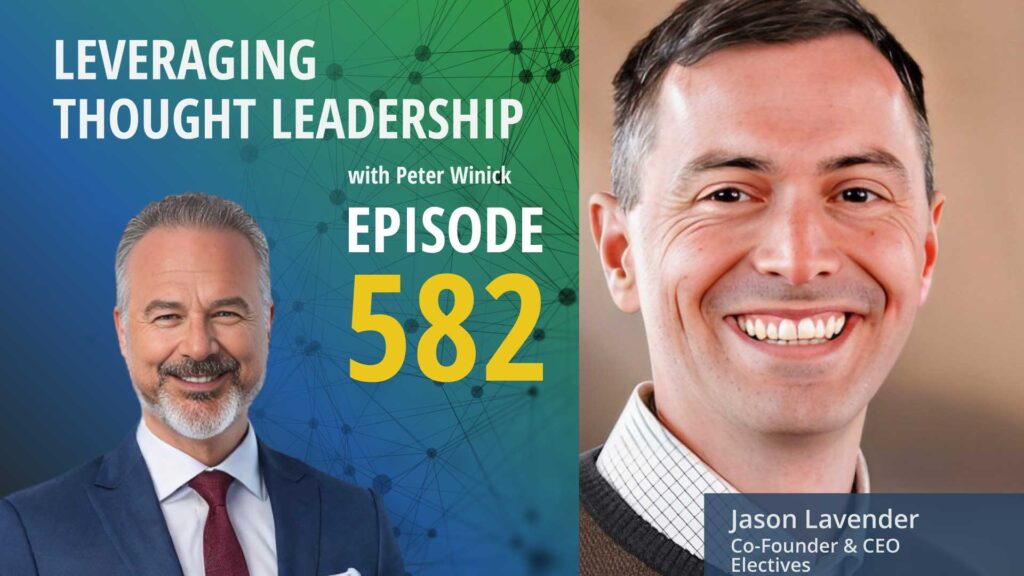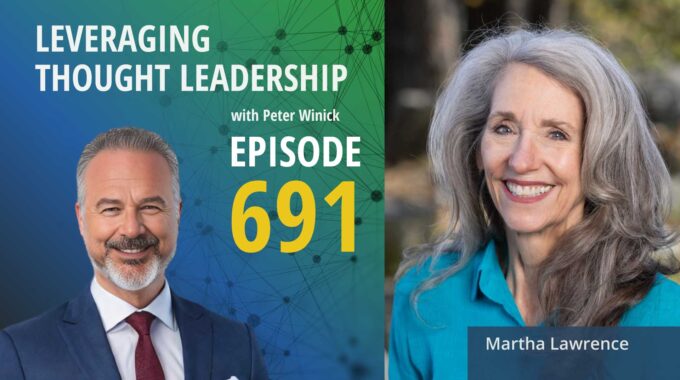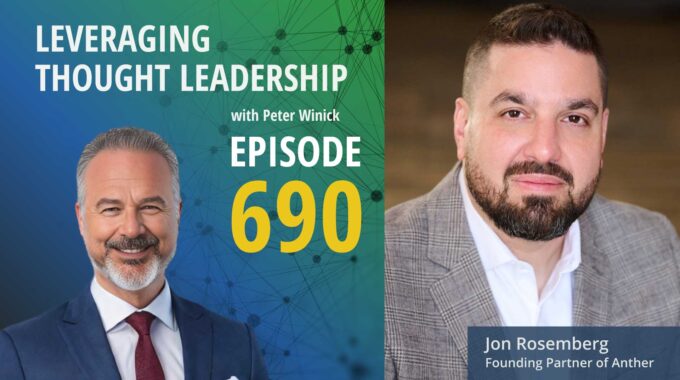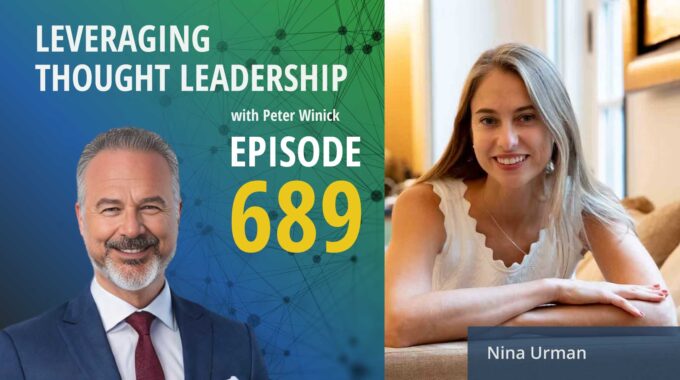A practical framework for leaders who want clarity and performance Timeless leadership principles that scale…
Revolutionizing Corporate Training | Jason Lavender

Leveraging Expertise and AI to Transform Corporate Training.
A conversation with Jason Lavender about his journey into corporate training and how his company Electives is making training easier, engaging, and more accessible.
In this episode of Thought Leadership Leverage, host Peter Winick sits down with Jason Lavender, the co-founder and CEO of Electives. Jason’s career journey is anything but linear. He started as an actuary, transitioned into strategy consulting, and eventually found his entrepreneurial spirit while working closely with innovators. A serendipitous six-week improv class, gifted by his wife, fueled his passion for creativity and human connection, shaping his unique career path.
Jason founded Electives to revolutionize corporate training. Frustrated by ineffective, impersonal training videos, he envisioned a platform offering live, virtual, and interactive learning. Electives aims to make high-quality, engaging training accessible and redefine who can teach in the corporate world. By recruiting experts from diverse fields—FBI agents, astronauts, professors, and executives—they provide a rich library of curated content, solving real problems without the need for months of searching.
Electives offers two training models: Private classes tailored to a company’s culture and Electives Membership, allowing employees to choose live classes from a broad selection. This dual approach addresses both team-wide issues and individual development needs. Electives also simplifies the procurement process, handling all logistics and payments, thus eliminating administrative headaches for both clients and instructors.
Looking ahead, Jason is excited about integrating AI to match business objectives with the necessary skills and corresponding courses, further enhancing the impact and efficiency of Electives.
Three Key Takeaways:
Interactive Learning Over Pre-recorded Content: Electives aims to replace ineffective training videos with live, virtual, interactive learning experiences, featuring experts from diverse fields such as FBI agents, astronauts, and executives.
Simplified Procurement and Payment Processes: Electives streamlines the process of finding, vetting, hiring, and paying trainers, offering a single point of contact for clients and ensuring instructors are paid promptly.
Future Integration of AI: Electives is developing AI technology to align business objectives with the necessary skills and corresponding courses, enhancing training effectiveness and efficiency.
Do you have training videos that you are not sure what to do with? Be sure to check out this short video where Peter Winick gives tips for creating and monetizing training videos.
Transcript
Peter Winick And welcome, welcome, welcome. This is Peter Winick. I’m the founder and CEO at Thought Leadership Leverage. And you’re joining us on the podcast today, which is leveraging thought leadership. Today. My guest is Jason Lavender. He’s the co-founder and CEO at Electives. And I’ll just give you a couple of words that will he’ll figure out how to get them all together for us from his background, because they’re usually not words you see on the same one. So improv actuary, HR, consulting and entrepreneur. So all right, let’s play Mad Libs, Jason. How does that all come together? Okay.
Jason Lavender That is a good question. Yeah. So I spent the first kind of five years of my career as an actuary. Yeah. I always joke that that I realized, the more I studied for these exams, the more boring my job got. So I was like, I don’t know what my reward for this is. So I had a great manager at the time. She said, why don’t you shift more into strategy consulting? It sounds like you love chatting with clients and people. And I said, that would be great. I can study less and I can see more people that that sounds like a really good combination. And then throughout that, it kind of just evolved. I ended up taking up an innovation role at a large consulting firm, really got close to a lot of other entrepreneurs. And slowly that referral itch and then improv came about. That was actually a gift from my wife. It’s I think she was trying to get give me a new hobby. I thought it would be a six week class and it would be over. And I got sucked into it for seven years and really fell in love with it. So definitely not part of the plan coming out of undergrad, but it all weaved together nicely, right?
Peter Winick Well, I love that. So I want to talk about your current venture, because you and I had this really interesting conversation a week or two ago, and you told me sort of the elective story. So this is where the entrepreneurial hack comes in. You saw an opportunity in the marketplace and did something about it. So tell me about what electives is and what the opportunity that you saw or the opportunity the marketplace was.
Jason Lavender Yeah, yeah. So the pain I felt was, was as an employee, I was working at a health care startup at the time, and we just had a we had a really bad corporate training one afternoon, I vividly remember the person who was running the training said that there was a new product feature that they were excited to roll out. I remember feeling excited about it. And then the feature was announced that they disabled the fast forward button on the videos. That was the that was the new feature. And so I remember spending like four hours just watching all of these videos, and they were they were pretty painful. It was a lot of learning, wasn’t a lot of human connection. And I just thought to myself, wow, corporate training really hasn’t evolved and hasn’t engaged people in quite some time. Maybe, maybe the history of corporate training didn’t think much of it.
Peter Winick And then so because I think that, you know, and not a lot of people want to talk about this out loud, but. Many of the participants are suffering through it. The delivery folks know there’s a better way. The economic buyer is realizing they’re not getting an impact on ROI. So if everybody realizes like, this is pretty awful, you know, like, why is that? So I’ve spent a lot of time thinking about that. I think some of it is, you know, price being driven to the bottom, risk aversion. It’s not where companies put their energy and their effort, but just the opportunity cost. Forget the hard cost of the amount of time your people are spent. You know, in essence, staring at the paint drying on the wall as opposed to doing something exciting is criminal horrible.
Jason Lavender Yeah, I couldn’t agree more. I think there is a, there is a default of kind of a check the box mindset, but I want to make sure that everyone has access, which means everyone has access to something not so great. It typically that next kind of level of thinking of how do we actually make this really good meet or work for the whoever is running that particular program. And a lot of people are stretched super thin. And so they say like, I’m just going to take the easy path. And but the thing in that covers all the boxes. But at the end of the day, employees don’t get too much out of it.
Peter Winick Right. So therefore electives was born. So tell me what that is. What electives does and, what it, what it’s trying to do differently in the world.
Jason Lavender Yes. So the there is really kind of two North stars when we, when we started the company three and a half years ago. So one was we wanted to make live, virtual, interactive learning easier and more accessible. So it felt like the default in every conversation we had was we have prerecorded libraries of content. And that was kind of the way the world was. And we started kind of in the middle of the pandemic. There is an opportunity here to just make live virtual learning more accessible. So that was one piece we really wanted to overindex on live interactive learning. So we’ve all been learning for thousands of years. Let’s talk about what is there. The second thing which was really interesting to us was this assumption in the market that the moment a company needed corporate training, they had to go find a person called a, quote, corporate writer. And we just felt like there was so many people overlooked in that kind of, narrow definition of who a corporate trainer is. And so we wanted to redefine who we could be learning from at work. And so we started recruiting FBI agents and astronauts and college professors and C-suite executives. And we were like, do you want to teach? And they were like, I actually love teaching. And so they.
Peter Winick Were a mentor because I think, you know, there’s a supply side and then there’s a demand side, right? So that clearly the traditional market was I am a sales trainer, I deliver sales training. Right. And I’m certified in these 2 or 3 processes or methodologies or frameworks. And that’s what I do. And I do a well right. And that and that was your choice. Now what’s kind of interesting is there’s so many people, whether your subject matter experts or whatever, that have the ability to teach others, but it might not be how they fancy themselves. It might not be their full-time thing, it might not be lots and lots of other things. But if you said to them, hey mister astronaut, would you like to teach a class to whatever? On what? On resilience or whoever you know from the comfort of your home 2 or 3 times a month at a reasonable fee? Would that be of interest to you? Now you’ve changed the game, right? Because that asked, I probably wouldn’t have reskill to say I’m going to go out and be a corporate trainer. Right? So I think that’s really cool.
Jason Lavender Absolutely. Yeah. And, I think the interesting part to just kind of piggyback off that example you just gave the desire to teach is there for a lot of folks, a little bit coaching and kind of structure, but they’re a really good class that the biggest pain point and you’ve probably seen this, you know, a million times is they don’t want to, you know, sell themselves. They don’t want to market themselves. They don’t want to like actually, they just teach. So that’s really what electives is doing is saying, hey, you know, astronaut, you could teach a class next Tuesday from 3 to 4 and like, yeah, that’s great.
Peter Winick I want to ask about another sort of trend, if you will, that I think you’re playing into nicely, which is in most large organizations, there’s the. Controlled training, if you will. Corporate says that we learn dot dot dot. Based on our capabilities model and your level three. And therefore you need to take this program and check the box and check the box. And that’s fine. But then I think what’s happened largely for, you know, because of things like LinkedIn learning and some other programs that the need has been democratized. So if I am a manager and I’ve got my team of ten and I’m like, kind of just getting this sense that maybe they’re not collaborating well, or maybe, you know, Jason could do better at giving feedback or whatever, whatever I can. Now I have some discretionary budget to say, you know, what I can spend in a couple of bucks because I think the team needs this, or I think the team would benefit from this. And it’s not contradictory what corporate dictates, but I have a perspective and a view that they don’t. Yes. Are people need to learn these capabilities and these skillsets whatever. But right now, at this time, for this group, I know because I’m the manager where I believe that they need this. Is that part of the player?
Jason Lavender Yeah, absolutely. There is an expression we often use is the future of learning within enterprises content curation not content creation. Yeah. And exactly to your point, it’s like we’ve seen a pain point. It’s urgent. We need to solve it this week. I don’t want to go internally and try to create, you know, a net new content over the next nine months. I want to curate that content. However, going out into the wild and curating that as a manager, you know, doing all the other things I’m doing is really challenging. And so you kind of go into electives, you find, you know, the content that we’ve already curated, vetted. We know it’s high quality, and then you can just tap into it right away.
Peter Winick Right. So yours is live on demand kind of specialists that can deliver their programs, etc.. So that’s really, really cool. And. If you’re enjoying this episode of Leveraging Thought Leadership, please make sure to subscribe. If you’d like to help spread the word about our podcast, please leave a five-star review at ratethispodcast.com/l t l and share it with your friends. We’re available on Apple Podcasts and on all major listening apps as well as at thought leadership leverage.com/podcast.
Peter Winick And how is it being received in the marketplace? What are you what are actually let me ask you that question two ways. So from when you started a few years ago, by the way, you know, the time stamp, this one, you know, that was like the beginning of Covid, right? Mid-Year, early Covid, two now what’s changed? What’s different about the way you rolled it out and what it’s evolved into today?
Jason Lavender Yeah, I would say the biggest change is there’s now two ways that employees can take classes. So when we first launched electives, everything was called a private class. So that was we partnered with a company. Some business leader within that organization would look in our whole class catalog and say, oh, I want to bring that giving feedback class or that presentation skills class to a group of my 40 employees.
Peter Winick That’s what I mean. Everybody would taking the classes, all employees of Citibank or Walmart or whatever.
Jason Lavender Exactly. Yeah. So they’re private. They’re customized in class. They’re prepping with the instructor. They making sure it really feels right to that culture. Back continues to be a core part of our business, but we’ve added a second way employees can learn that product is now called electives membership. What ship does is gives employees at these all these different companies a license to go pick any to live classes every month that they want to take. The caveat is then they’re in class with employees from all of these different companies, but they’re getting to kind of self-select into the classes that are most relevant and timely for them. And so if you think of the, you know, the classic example I always give is like. A company might feel like we need to improve our presentation skills. That’s great. Let’s bring everybody together. But those 40 people also have 40 other unique things going on in their personal or professional life that they’re trying to develop. And now they can go into the membership program and say, I want to take coping with grief. And the other person says, I want to take another presentation skills class, or I want to take a, I prompt engineering class. So what we wanted to do over time was just give that business leader still the, you know, kind of in to pick the classes, but also give the end learner the autonomy to go pick whatever they need to develop in that moment.
Peter Winick Interesting, interesting. And. The two. Models. You know, it’s the old school open enrollment versus closed program. One is not better than the other. They’re different. Right. You know, and we could debate the differences of, well, if it’s everybody from this company, we’ve been to the culture, if it’s open, it’s more diverse. What are you seeing from a learning efficacy wise? Any variance between the two formats?
Jason Lavender The most interesting thing that we tested early days was that even at a high level, when we when we started membership, we said, are people going to show up and are people going to be camera and engage? Those were kind of our just baseline period questions. For the more kind of tactical like manager type of classes. Membership is really good because people will just be more vulnerable. They’ll say, like, I have this manager who does this, or I struggle with this. Like they don’t talk about that as openly in a private setting. For more of the cultural types of classes. I’ll put like a die class in that packet. That is way, way better in a private setting because it’s a little bit more emotional. There’s some human connection like that level of vulnerability is actually more awkward in membership than it is with your colleagues. So there’s just kind of a content theme difference that I that is pretty telling.
Peter Winick I think that the delta there is really culture, right. So if we all work in a firm and there’s a culture of being passive aggressive or vulnerable, whatever it is, it’s like, oh, we can relate to that as a trait of working at company X. So that makes a lot of sense. But like you said on the other side, how smart is it from a career standpoint to say, hey, you know the problem? The reason I’m taking this feedback class is my boss is a jerk. And then you everybody can figure out, oh, Peter works for Mary. Mary must be a jerk. Oh, I just saw her in the cafeteria. Like, that’s not a smart move.
Jason Lavender Yeah.
Peter Winick So I think I like the way that you’re saying, well, there’s different, different pieces there. So I love the framing and the model and sort of the on demand piece and expanding it. I think the other thing, and that I want to touch on is you’re also short circuiting. For an individual or someone teaching the class the help that is procurement. Right? Like so for an individual person that might deliver a class for a couple thousand bucks a couple times a year, the bandwidth sometimes, or the patience or whatever to go through a pretty rigorous procurement process. Sometimes it’s not worth it. It’s just it’s no fun whatever. But to sign up on your platform, you’ve kind of already done the vetting and the billing and the finance and the all that stuff. That is not why anybody wants to do these type of things.
Jason Lavender Yeah, yeah, that was a pain point that we did not know. That was such a big pain when we started the company. Oh yeah. But then I’ll share kind of both sides of that pain point. So one of our first enterprise clients I’ll never forget, they reached out to us inbound and we were hopping on the phone and I was ready to like, kind of do a demo and walk them through electives. And their chief people officer said, before you do a demo, can I just share my pain point? And I said that that’s actually preferred I would love to know. And they said the prior year they had curated, sourced and contracted with 126 external trainers, speakers, etc. and she kind of joke, she was like, that also means they all went through procurement. They all went through everything, they went through data privacy, etc. not to mention the quality was all over the board. So like total administrative nightmare. And so she closed her opening kind of problem statement with so if I understand electives correctly, you do all that and we only pay you that. And we laughed were like actually, yeah. We never thought of it like that. So that was on the business side. On the instructor side, you’re totally right. The procurement, the data privacy. The other thing, chasing invoices is a huge pain for them too. And so on our platform. Yeah, our instructors get paid the day the class. Like they don’t need to wait 90 days and, you know, track their involved software. So there is a lot of those just administrative headaches that.
Peter Winick You don’t have to make the same argument again and again of why I own my IP and derivative use case and all these other things. Interesting. All right. As we as we start to wrap, what do you see? Moving forward in terms of your growth and adoption and, and, you know, are there programs where this works better or worse, types of companies where it works better when they’re maybe they’re not big enough to have a full fledged training group. Like what? What do you see as sweet spots and opportunities?
Jason Lavender Yeah, I’ll share kind of a market sweet spot and then a new kind of tool that we’re excited about. So on the market side, for us it’s a pretty broad range. But I would call it like the 50 to 500 employee company where there are people team is really lean. They don’t have a full learning and development staff. You know all their employees are asking for development and growth opportunities, but they just don’t have the bandwidth to do anything. That that tends to be our sweet spot. The thing that we’re most excited about, and it’s so hard to not talk about AI these days, but my co-founder and team have been working on this new AI tool that basically translates a company’s business goal to the skills that are needed to the class content that that builds a skills. And that part is the most exciting in terms of just the conversations we’re having with people leaders is like we’re hearing we need to improve net revenue retention by 10%. We know that it is a business model. Actually mapping that to development is really hard. It’s kind of like, how do I improve net revenue retention? Is that a time management thing? Is that an upselling cross-selling thing, like how do I actually use people to develop to hit that goal? And so part of the thing that we’re most excited about is we’ve spent the last three years curating all this amazing content, right? How do we actually just match this is the right content for these people to achieve that business skill. Or that’s.
Peter Winick By the way, is what every CEO once of their training organization without. And sometimes they just sort of wash their hands of it and say, well, they’re doing the best they can. They’re good people. But, if only I were, I could be heard. So I love I love that really cool things too. I appreciate your time and thank you for sharing your story and your journey. And I think it’s a it’s an interesting thing you got going there. So good stuff.
Jason Lavender Thanks so much for having me, Peter.
Peter Winick To learn more about Thought Leadership Leverage, please visit our website at ThoughtLeadershipLeverage.com. To reach me directly, feel free to email me at Peter at ThoughtLeadershipLeverage.com, and please subscribe to Leveraging Thought Leadership on iTunes or your favorite podcast app to get your weekly episode automatically.





